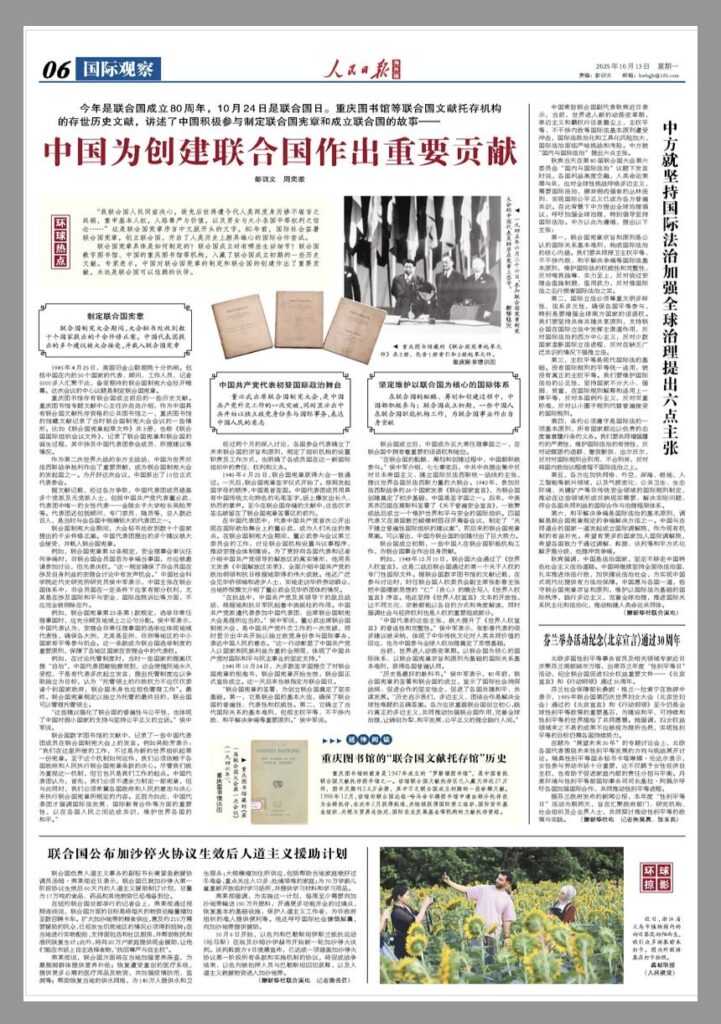
The front page of today’s People’s Daily announces the publication of a major policy article by Chinese leader Xi Jinping (习近平) in the party’s flagship theoretical journal Qiushi (求是), bundling together what the party now characterizes as “Four Great Global Initiatives” (四大全球倡议) — a quartet of related solutions for international challenges. The article, titled “Promoting Implementation of the Global Development Initiative, Global Security Initiative, Global Civilization Initiative, and Global Governance Initiative,” collects Xi’s statements from September 2021 to September 2025, organizing them around his concept of a “community of shared future for mankind” (人类命运共同体).
The piece is meant to synthesize China’s response to what the party characterizes as four critical “deficits” (赤字) facing the world. These are: the “peace deficit” (和平赤字); the “development deficit” (发展赤字); the “security deficit” (安全赤字); and the “governance deficit” (治理赤字).
This suite of global initiatives, the People’s Daily read-out today says, is China’s effort “to resolve the above deficits and promote the building of a better world” (破解上述赤字, 推动建设一个更加美好的世界). This framing positions Xi as a responsible and responsive global leader offering comprehensive solutions to international challenges. In this equation, the Belt and Road Initiative (一带一路), lionized during Xi’s first and second terms, is subordinated as a practical vehicle for these loftier aspirations.
The bundling of Xi’s “Four Great” initiatives has gathered pace particularly since late August and early September, taking the stage during the annual summit of the Shanghai Cooperation Organization (SCO). The push to promote the concepts has redoubled this month with a crucial CCP plenum next week and the upcoming 80th anniversary of the founding of the United Nations. The quartet signals Xi’s effort to consolidate his standing with both domestic party elites and the international community.
The People’s Daily read-out hailing the Qiushi article referred to this year “an important moment to remember history and create the future together” (铭记历史、共创未来的重要时刻). And the central idea here is that Xi Jinping is claiming this crossroads for China under the rule of the CCP.

In recent weeks, before and through the grand military parade held in Beijing on September 3, state media have promoted a revisionist view of history in which China — meaning the current People’s Republic of China under the leadership of the party — played the most decisive role in the founding of the United Nations. Among these efforts, a large feature story in the overseas edition of the People’s Daily on Monday focused on China’s “immense contributions” to the founding of the UN, with framing that completely erased the role of the Republic of China (ROC) — the current name for Taiwan. The feature story showcased materials from the first session of the UN General Assembly now kept in Chongqing, the wartime capital of the ROC.
When it comes to China’s gaze on the future as glimpsed in Xi’s Qiushi article, there is an implicit but unmistakable message about the values of the West as failing to be “inclusive” (包容). Language about the Global Civilization Initiative (GCI) speaks of respecting “diversity of world civilizations” (世界文明多样性), an implicit challenge to the notion of universal values that promotes China’s own concept of “common values for all humanity” (全人类共同价值). While those may sound superficially similar, China’s formula emphasizes the power of the nation state over citizens and communities — the “rights” of countries and their systems taking precedence over individual rights.
Another clear message between the lines is about the United States as an irresponsible force. The Global Governance Initiative (GGI) directly confronts what the party portrays as threats from “Cold War mentality, hegemonism, and protectionism” (冷战思维、霸权主义、保护主义) — barely coded language that is a clear reference US policies. The article argues that while the UN emerged from the “painful lessons” (痛定思痛) of two world wars 80 years ago, “the world has entered a new period of turbulence and transformation, and global governance has reached a new crossroads” (世界进入新的动荡变革期,全球治理走到新的十字路口).
The underlying message is unmistakable: Standing at this crossroads, the world must turn in the direction of China.




















